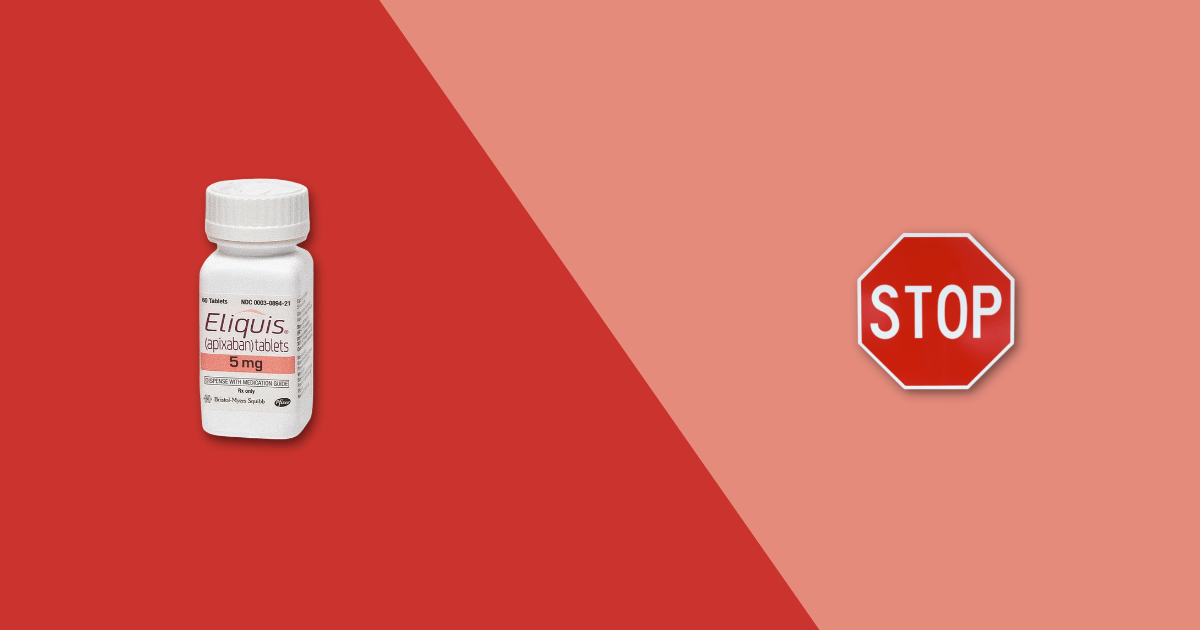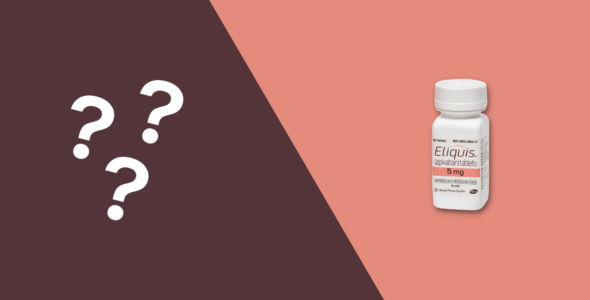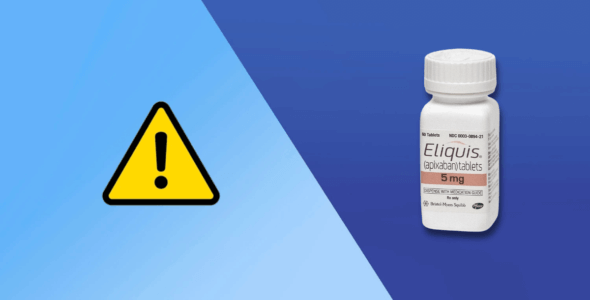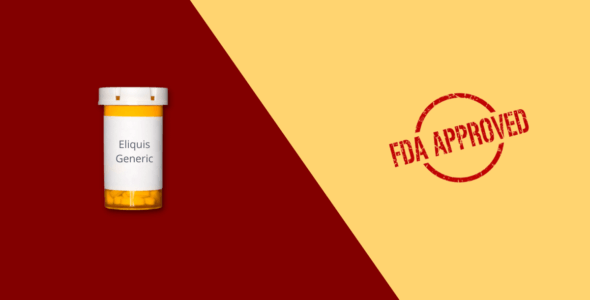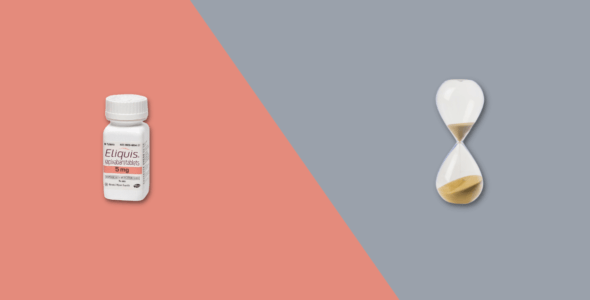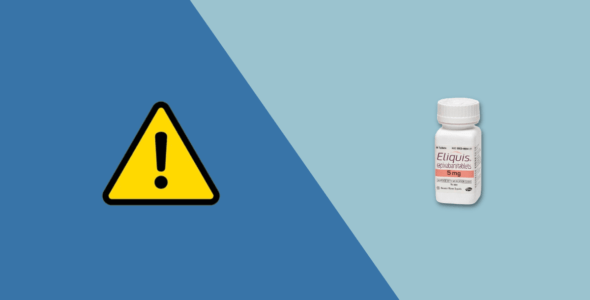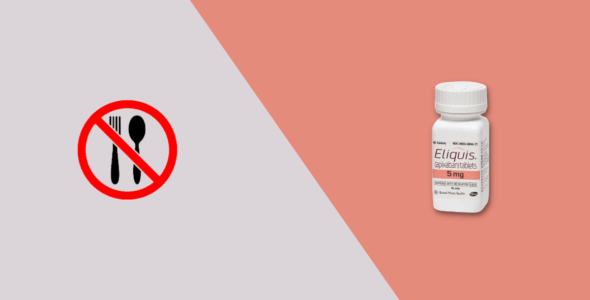How do you stop taking Eliquis safely?
Table of contents
Eliquis is a brand-name medication manufactured by Bristol-Myers Squibb. It is an anticoagulant used to prevent blood clots from forming in the body.
Here we will take a look at what Eliquis is, how you take it, its side effects, drug interactions, precautions, and how to stop taking it safely.
What is Eliquis (apixaban)?
Eliquis is an anticoagulant, a type of drug that stops blood clotting (coagulation). The medication is used to prevent blood clots from forming in people who have:
- Nonvalvular atrial fibrillation/AFiB (irregular heartbeat not caused by a heart valve problem) and who have other clotting risk factors
- Had hip or knee replacement surgery
It’s also used to treat deep vein thrombosis (DVT’s) and pulmonary embolism, and to stop blood clots from reoccurring in blood vessels in these places.
Blood clotting is a normal process that happens when you’re injured. If you cut yourself, a clot forms to seal the cut to stop you from losing any more blood. But sometimes blood can clot inside your body where it shouldn’t, and this can cause problems. Clots can block the flow of blood, starving parts of the body of oxygen, and damaging tissues. Depending on where blood clots form, they can cause deep vein thrombosis, heart attacks, and strokes. Sometimes Eliquis is called a blood thinner, as it helps to lower the chances of blood clots forming.
The active ingredient in Eliquis is an anticoagulant called apixaban. As blood clots, it goes through a process of chemical reactions that turn it from a liquid into a thick gel. An enzyme called factor Xa is an important part of this process. Apixaban is a factor Xa inhibitor and attaches to factor Xa to stop it from working, reducing the likelihood of blood clots forming.
Eliquis dosage
Eliquis is available in tablet form, in the following doses: 2.5 mg and 5 mg.
The recommended dose of Eliquis is 5 mg orally twice daily. For elderly patients 80 years of age or older, weighing 60 kg or less, or having serum creatinine equal to or above 1.5 mg/dL, the recommended dose is 2.5 mg orally twice daily.
If you are unable to swallow the tablets whole, you may crush them and mix with water, apple juice, or applesauce and taken orally. Crushed tablets may also be mixed with 60 mL of water and given through a nasogastric tube.
If you take heparin, warfarin, Coumadin, or Jantoven, your doctor will give you instructions about how to switch to apixaban. You do not need to monitor your Vitamin K intake while taking Eliquis. If you miss a dose, take it as soon as you remember. If it is almost time for your next dose, skip the missed dose and take your next dose at the normal time.
You are advised to read the prescribing information, and medication guide provided with this medicine for the full drug information, and always speak with a healthcare professional for medical advice about any changes to your dose so they can monitor and evaluate your condition.
Common side effects of Eliquis
The most common possible side effects of Eliquis in clinical trials include:
- Increased bleeding risk – anemia, increased bruising, bloody or brown urine or bloody or tarry stools, bleeding from your anus or vagina, vomiting blood or what appears to look like dark coffee grounds, unusual nosebleeds
- Headache, dizziness, weakness, pain, swelling, or discomfort in a joint
- Pinpoint red spots on your skin
Eliquis can cause more serious side effects, including:
- Major bleeding
- Joint pain
- Life-threatening allergic reactions including anaphylactic allergic reactions. This is a medical emergency. Call your doctor right away if you develop a skin rash, itching, trouble breathing, chest pain, difficulty swallowing, or any swelling of your hands, face, or mouth
- Thrombocytopenia (including platelet count decreases)
- Hypotension
- Epistaxis
- Gastrointestinal hemorrhage (bleeding)
- Abnormal liver function tests
- Incision-site hematoma
If you experience any serious side effects, stop taking Eliquis and seek medical attention immediately. You are encouraged to report negative side effects of prescription drugs to the FDA. Visit www.fda.gov/medwatch, or call 1-800-FDA-1088.
Eliquis warnings & precautions
Don’t take Eliquis if you:
- Are allergic to the active ingredient apixaban
- Are allergic to any of the other ingredients found in Eliquis
- Have artificial heart valves
- Have antiphospholipid syndrome (APS), especially with positive triple antibody testing, and have a history of blood clots
- Are under 18 years of age
- Are bleeding excessively
- Have an organ condition that increases the likelihood of serious internal bleeding, like a stomach ulcer
Talk to your doctor about your medical condition before taking Eliquis if you:
- Have an increased risk of bleeding, such as a bleeding disorder or very high blood pressure
- Are over 75 years of age
- Weigh 60kg or less
- Have a severe kidney disease or are on dialysis
- Have a liver problem or a history of liver problems
- Have antiphospholipid syndrome
- Are lactose intolerant
- Need to have surgery or another procedure that can cause bleeding
- You are pregnant or breastfeeding
You should always check with your doctor or pharmacist before taking any medication, including Eliquis, to make sure it is safe for you.
Other warnings you should know about
- Eliquis may need to be temporarily stopped a few days before surgery of any sort, including dental procedures
- Speak to your doctor before you stop using this medicine. There may be a higher risk of stroke if you stop using this medicine suddenly.
- Grapefruit juice may increase the amount of Eliquis in your body. Talk with your health care provider or pharmacist if grapefruit is part of your diet
- Eliquis may increase the risk of blood clots in the epidural area or spine. The risk of this occurring increases if an epidural catheter has been previously placed in your back prior to treatment with Eliquis, if NSAIDs or anticoagulants are being taken, if you have previously had spinal punctures in the epidural area or any other issues with your spine, or if you have had surgery in the past on your spine. Symptoms may include a tingling sensation, feeling numb, or muscle weakness, specifically in your feet or legs.
Eliquis drug interactions
Eliquis can interact with other medications. These include:
- An antifungal medicine
- Antiviral medicines for HIV/AIDS
- Nonsteroidal anti-inflammatory drugs
- Pain medications
- Medicines for high blood pressure or heart problems
- Antithrombotics
- Vitamin K antagonists
- Antidepressants
- Medicines to prevent epilepsy or seizures
- Medicines to treat tuberculosis
- St John’s Wort
Eliquis can interact with other medications. This can change how Eliquis works and can make side effects more likely. Tell your prescribing physician about all your drugs, including over-the-counter, vitamins and dietary supplements.
Can you stop taking Eliquis cold turkey?
Eliquis does not cause withdrawal symptoms when stopped suddenly. But stopping treatment with Eliquis suddenly may increase the risk of blood clots.
What happens when you stop taking Eliquis?
How fast blood clots in your body will return to what it was before you started taking Eliquis. This is normally within a few days. You may be at a higher risk of a heart attack, stroke, pulmonary embolism, or deep vein thrombosis.
How long does Eliquis stay in your system after stopping?
Eliquis will stay in your system for around 24 hours after you have stopped taking it.
Can stopping Eliquis cause a stroke?
Stopping treatment with Eliquis will increase your risk of a stroke if you were taking it for atrial fibrillation. Speak to your doctor for medical advice if you are considering stopping Eliquis.
How long do you need to stop Eliquis before surgery?
Treatment with Eliquis should be stopped one or two days before surgery or any dental procedure. Speak to your doctor for medical advice if you are thinking about stopping your Eliquis.
Does Eliquis cause depression or anxiety?
Eliquis is not associated with causing anxiety or depression.
How do you switch from Eliquis to aspirin?
Aspirin should not be taken with Eliquis, unless prescribed by a doctor. Speak to your doctor for advice on how to switch from Eliquis to aspirin safely.
How long does it take to stop Eliquis?
The effects of Eliquis on blood clotting begin to reduce within 24 hours of stopping treatment in most people.
What are the side effects of stopping Eliquis?
Eliquis does not cause withdrawal symptoms when stopped. But stopping treatment with Eliquis may increase the risk of blood clots. This is normally within a few days. You may be at a higher risk of a heart attack, stroke, pulmonary embolism, or deep vein thrombosis.
What should you do if you forget to take Eliquis?
If you miss a dose of Eliquis, take it as soon as you remember but if it is almost time for your next dose, skip the missed dose and return to your normal dosing schedule.
What happens when you suddenly stop taking blood thinners?
Stopping blood thinners suddenly can increase the risk of blood clots.
Can you stop Eliquis for 3 days?
Eliquis can be stopped 2-3 days before surgery
Do you have to stop taking Eliquis if you get pregnant?
Anticoagulant treatments such as Eliquis, Pradaxa, and Xarelto are not recommended during pregnancy. Treatment with Eliquis may cause uterine bleeding.
Do you need to wean off of Eliquis?
No, you do not need to wean of Eliquis as it does not cause withdrawal symptoms if stopped suddenly. Stopping Eliquis treatment may however increase your risk of blood clots.
How do you get help if you’re addicted to Eliquis?
Eliquis is not addictive and does not cause withdrawal symptoms when stopped. Speak to your doctor for medical advice if you are planning to stop taking Eliquis,
Medically reviewed
A medical professional has reviewed this article.


Jamie Winn, PharmD
Jamie Winn, PharmD
Dr. Jamie Winn received his Doctor of Pharmacy in 2002 from the University of South Carolina College of Pharmacy, Columbia, SC. Jamie is a medical reviewer for NiceRx.

